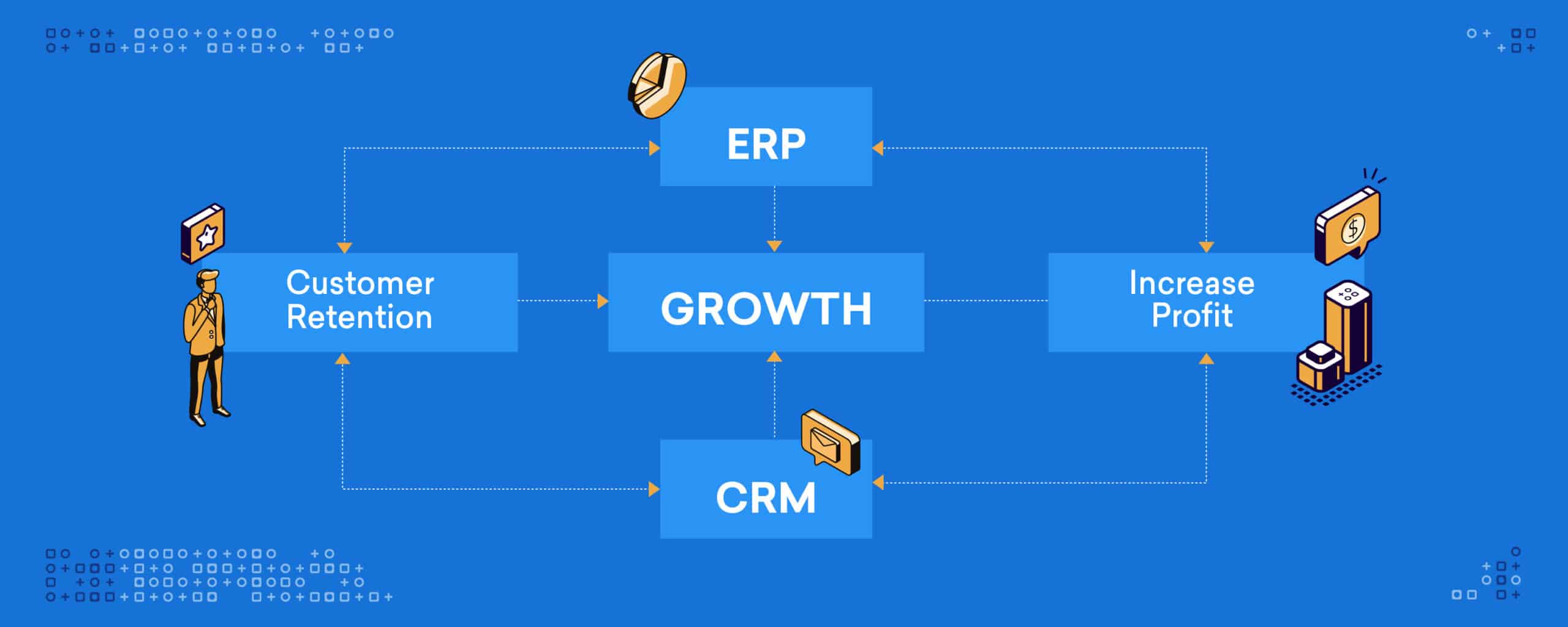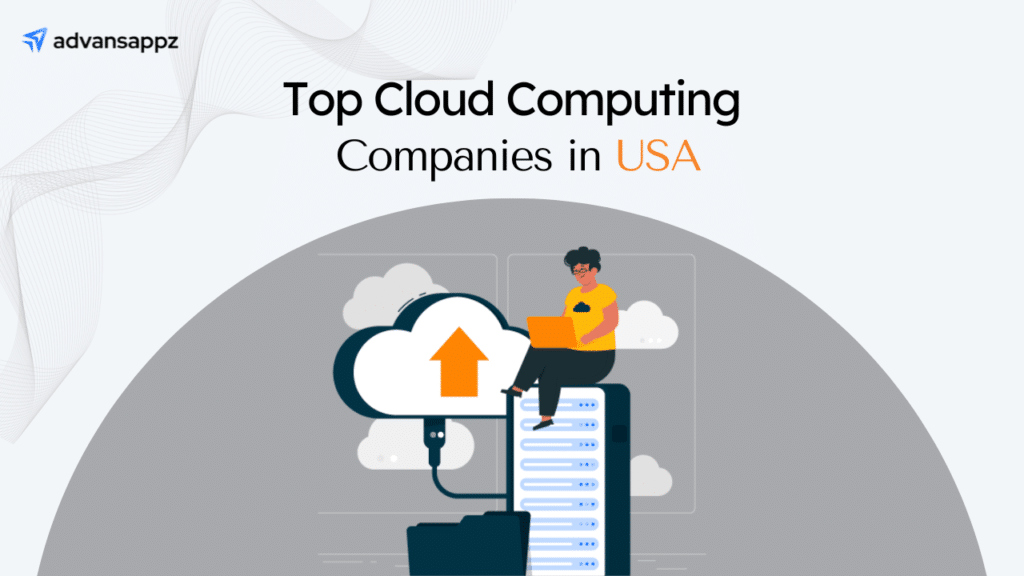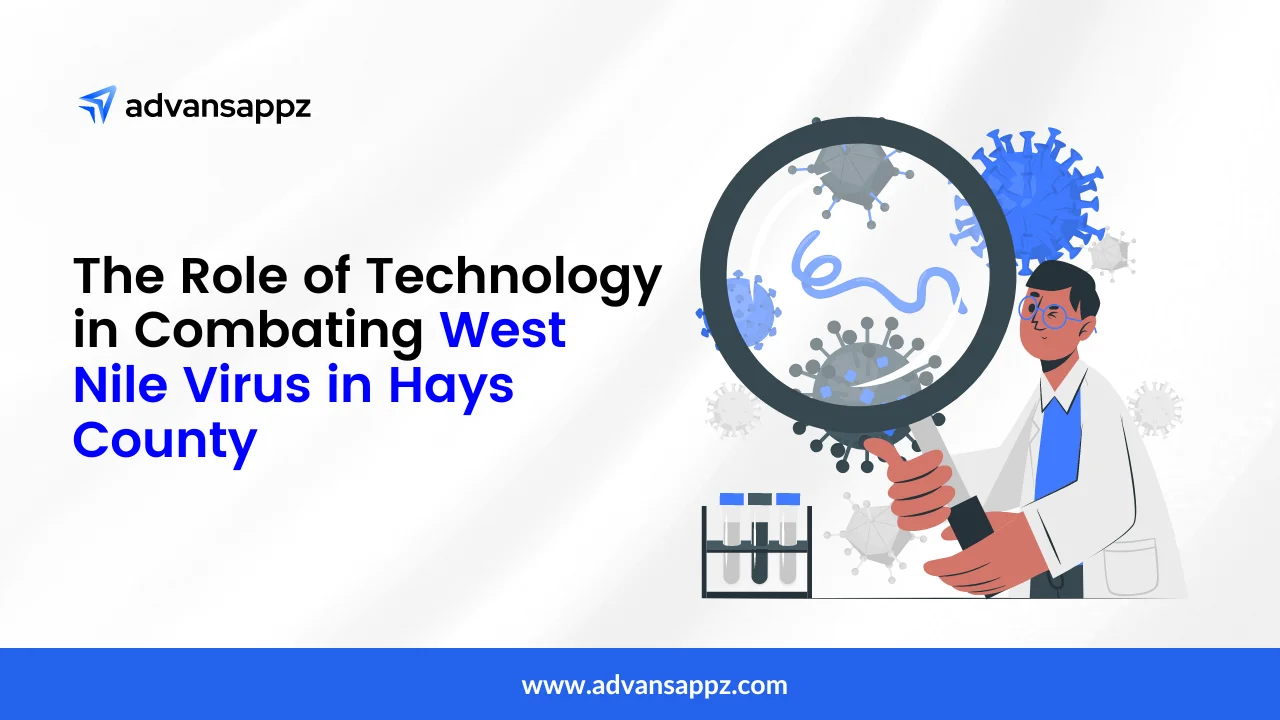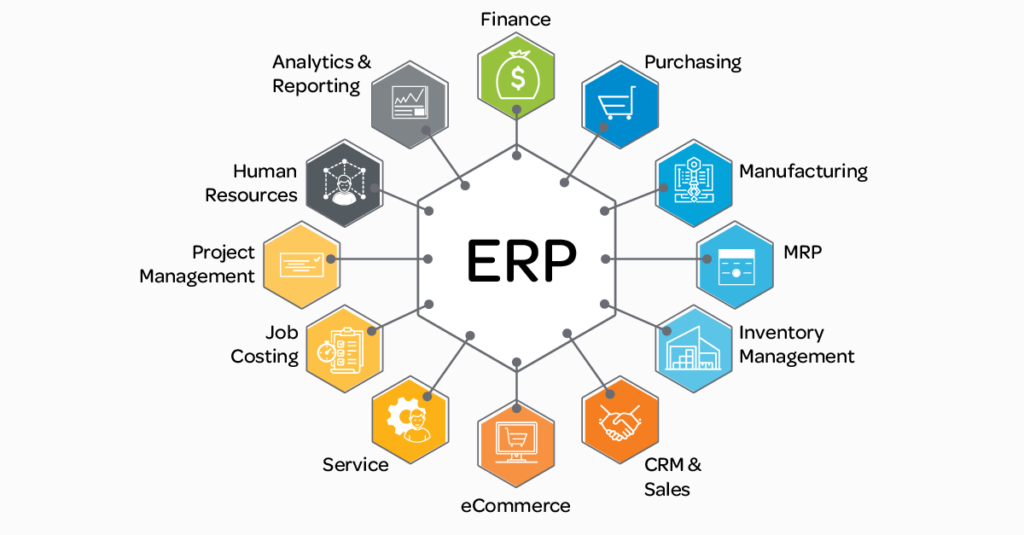
A report by MarketsandMarkets estimates that the global ERP software market size will grow from $35.81 billion in 2018 to $78.40 billion by 2023, representing a compound annual growth rate of 16.2%. This growth is driven by the increasing demand for cloud-based ERP systems, which are more flexible and affordable for startups and small businesses.
ERP systems also provide startups with better decision-making capabilities, as they can access real-time data and analytics to inform their strategic choices. In a small and medium-sized businesses survey by Software Advice, 86% of respondents said that their ERP system improved their decision-making capabilities.
ERP platforms are integrated software applications that help organizations manage their business operations with automated processes. In this article, we will understand why ERP systems are important for businesses, especially startups.
So, let’s dive into the process of learning about ERP platforms and their importance.
What is an ERP System?

ERP, or Enterprise Resource Planning, is a system that helps businesses to organize their day-to-day operational tasks. Some important tasks include accounting, finance management, project management, procurement, supply chain operations, and risk management.
Hundreds of businesses are now relying on ERP platforms to manage organizations effectively. Two-thirds of manufacturers claim their business operations were very successful after implementing ERP systems. Hence, it has become an indispensable part of the business as electricity is essential for the venture.
Why do Startups Require ERP systems?

ERP Systems Promote Effective Decision Making
ERP systems provide startups with real-time data and analytics, which can help inform their decision-making processes. They can centralize data from across the organization, providing a comprehensive view of business operations that can be analyzed and acted upon.
For example, a startup is considering expanding into a new market. With an ERP system in place, they can analyze data on sales, inventory, and customer behavior to determine this expansion’s feasibility and potential ROI. They can also use data to identify any operational inefficiencies that need to be addressed before expanding.
Furthermore, ERP systems can help startups with supply chain management decisions. By centralizing data on inventory levels, supplier performance, and shipping times, startups can optimize their supply chain operations and make more informed decisions about supplier selection, inventory management, and shipping logistics.
ERP Systems Boost Scalability
ERP can help startups with scalability by providing a centralized system to manage various business processes such as finance, inventory, human resources, and customer management. This allows startups to streamline their operations and improve their efficiency as they grow, reducing the need for manual processes and minimizing errors.
Let’s take the example of a food delivery startup. Initially, the startup manages orders and deliveries manually, but the process becomes cumbersome and prone to errors as it grows. By implementing an ERP system, the startup can automate and streamline its order management and delivery processes, making handling a larger volume of orders and ensuring timely deliveries easier. This can help the startup scale its business and meet growing demand while maintaining quality and efficiency.
ERP Systems are Cost Efficient
ERP systems can be cost-effective for startups by providing affordable pricing models, improving efficiency and productivity, reducing errors and inefficiencies, and offering scalability and flexibility as businesses grow and evolve.
Cloud-based ERP solutions are becoming increasingly popular and show more affordable pricing models than traditional on-premises systems. In addition, by streamlining business processes and centralizing data, ERP systems can reduce the time and resources required to perform tasks such as inventory management, order processing, and financial reporting, leading to cost savings and improved profitability.
Lastly, ERP systems allow startups to add new functionality, users, and modules as needed, making them scalable and cost-effective solutions for growing businesses.
Therefore, in this situation, ERP systems can significantly help businesses to reduce inventory costs and become cost-efficient software.
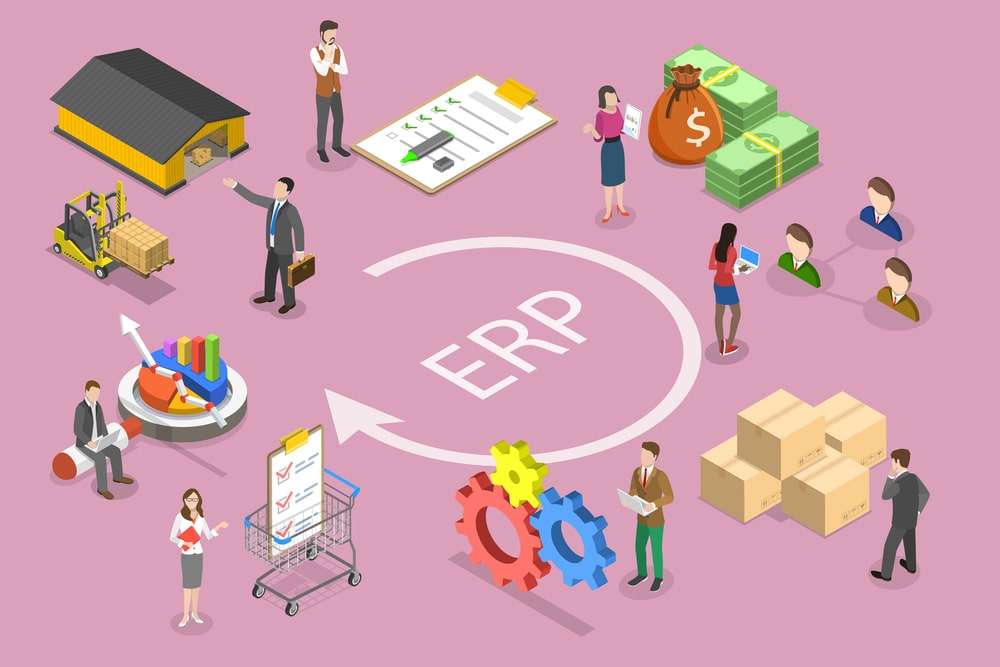
ERPs Give STartups a Competitive Advantage
ERP systems help manage and produce products more efficiently than traditional methods. This enables them to achieve a competitive advantage and gain more profit over time. Here is how ERP helps:
ERP provides real-time data about what is happening in your business. So this helps you know your strengths, bottlenecks, or other problems which you can solve at the initial stage rather than waiting for them to become a significant issue.
This real-time data also helps you to schedule the business functions and make proper estimates of production, costs, supply chain, and many more. Therefore, when you have this information handy with the daily process, you can get an edge over your competitors.
Compliance Management
Compliance Management is important for the business as it saves them from unwanted legal actions of fines, lawsuits, or penalties. Therefore, it is essential to manage the rules and regulations for the business. However, the regulations are not static. They are accustomed to change, and businesses have to cope with it. Manual interpretation of rules and regulations can be difficult sometimes, so automated ERP systems help in this scenario.
There are various regulations and compliances that a business has to follow to cope in the market. A business has to maintain standards like accounting, data protection, auditing, and finance. If there is an ERP system in the startup, there is an automated regulatory system that updates such compliance and thus reduces the manual work of the organization.
Transparency
Startups need to track all the business operations at the initial stage to analyze their functioning. While they can do so with manual interference and track all the operations like employee performance, projects, project planning, and many more, it takes time, and work pressure might increase.
On the other hand, with ERP systems, they can get real-time access to all such data with the automated process, and you can track every business process effectively. The single source of data across operational areas helps to improve efficiency, reduction of errors, and maintenance of transparency in the business.
ERP Systems Improve Productivity
One of the primary benefits of ERP solutions is improved efficiency and productivity. By automating routine tasks and providing real-time data access, ERP systems can help streamline business operations and reduce manual workloads. This, in turn, allows your employees to focus on higher-value activities, such as innovation and customer service.
ERP Systems can Streamline Data Operations
The centralization of business data is important; therefore, ERP provides a unified platform where startups can access their centralized data. They can access any data related to their business with effective management.
There is an added benefit for streamlining data management: if the ERP is managed on the cloud, you can access it anytime and anywhere. There would not be any regional restrictions on data accessibility.
Challenges of Implementing ERP Systems for Startups
Implementing an ERP system can be a challenging task for startups, especially when they face various resource constraints. Here are some statistics that highlight the common challenges that startups face when implementing ERP systems:
Cost:
- According to Panorama Consulting Group, the average cost of an ERP implementation is $7.1 million, and the average time to complete an implementation is 16.2 months.
- A survey conducted by the Cloud Security Alliance found that 61% of respondents cited cost as the primary barrier to cloud adoption, which includes ERP systems.
Complexity:
- According to the 2021 ERP Report by Software Advice, 52% of respondents cited complexity as the most significant challenge they faced during the ERP implementation process.
- A study conducted by the Standish Group found that only 33% of ERP implementations were successful, while 50% were challenged, and 17% failed due to complexity and poor project management.
Resistance to Change:
- According to a survey by Deloitte, resistance to change was the most significant challenge for organizations implementing ERP systems, cited by 41% of respondents.
- A study conducted by the University of South Florida found that employee resistance to change was the primary reason for the failure of ERP implementations.
Lack of Resources:
- A survey by the Cloud Security Alliance found that 52% of respondents cited a lack of in-house expertise as a barrier to cloud adoption, which includes ERP systems.
- According to the 2021 ERP Report by Software Advice, 37% of respondents cited a lack of IT resources as the most significant challenge they faced during the ERP implementation process.
Case Studies of Startups Implementing ERP Systems
Freshly: Freshly is a meal delivery startup that implemented an ERP system to streamline its supply chain and inventory management processes. The system allowed Freshly to automate order processing, reduce manual errors, and optimize its production process. As a result, Freshly saw a 65% reduction in inventory costs, a 50% reduction in inventory levels, and a 10% increase in order fulfillment rates.
Pet Plate: Pet Plate is a subscription-based pet food delivery startup that implemented an ERP system to manage its end-to-end operations. The system allowed Pet Plate to optimize its inventory management, automate order processing, and improve its supply chain visibility. As a result, Pet Plate saw a 15% increase in order accuracy and a 30% reduction in customer support tickets related to order fulfillment.
The Bouqs Company: The Bouqs Company is an online flower delivery startup that implemented an ERP system to manage its supply chain and logistics processes. The system allowed The Bouqs Company to optimize its inventory levels, automate its order processing, and improve its shipping and logistics operations. As a result, The Bouqs Company saw a 25% reduction in shipping errors, a 50% reduction in order fulfillment times, and a 10% increase in customer satisfaction ratings.
Also check: Cloud-Based ERP
Bottom Line
ERP system provides startups with a robust platform for managing operations, supporting growth, improving efficiency, and expanding the business. The system also leads to more innovation and growth in the business, which is difficult with manual management.
Hence, by implementing an ERP system early, startups can pave the way toward success and achieve their goals more effectively and easily. For companies looking for advanced ERP solutions, advansappz is the name you can take into consideration.
Frequently Asked Questions
Startups can greatly benefit from implementing an Enterprise Resource Planning (ERP) system. Here are some reasons why startups should consider adopting an ERP:
-
Streamlined Operations: ERP systems integrate and automate various business processes, such as inventory management, procurement, sales, finance, and HR. By centralizing these processes into a single system, startups can streamline their operations, reduce manual tasks, and enhance overall efficiency. This allows startups to focus more on core business activities and scale their operations effectively.
-
Data Integration and Visibility: Startups often have multiple systems and data sources that operate in silos, which can hinder decision-making and lead to inefficiencies. An ERP system brings together different functions and departments, enabling seamless data integration and providing real-time visibility into key business metrics. This allows startups to make informed decisions based on accurate and up-to-date information.
-
Scalability and Growth: Startups aim to grow rapidly, and an ERP system can support that growth by providing a scalable platform. ERP systems are designed to handle increasing transaction volumes, accommodate new users, and adapt to evolving business needs. They provide a solid foundation for startups to scale their operations and manage increased complexities as they grow.
-
Enhanced Financial Management: Financial management is crucial for startups, and an ERP system provides robust financial modules for managing accounting, budgeting, invoicing, and financial reporting. By automating financial processes and improving accuracy, startups can gain better control over their finances, ensure compliance with regulations, and make informed financial decisions.
-
Improved Customer Relationship Management (CRM): Startups need to establish and maintain strong relationships with customers. An ERP system with integrated CRM functionality enables startups to manage customer interactions, track sales leads, and provide better customer service. This helps startups build customer loyalty, increase sales, and improve overall customer satisfaction.
Whether a startup needs an Enterprise Resource Planning (ERP) system depends on several factors, including the size, complexity, and nature of the startup’s operations. While ERP systems can offer significant benefits, they may not be a necessity for all startups. Here are a few considerations to help determine if a startup needs an ERP:
-
Scale and Complexity: Startups with simple operations and a small number of employees may not require the extensive features and functionalities provided by an ERP system. If the startup’s processes can be effectively managed using basic software or manual methods, an ERP may not be necessary at the early stages.
-
Growth Plans: Consider the startup’s growth plans and the anticipated increase in transaction volumes, customer base, and operational complexity. If the startup expects rapid growth or plans to expand into multiple locations, an ERP system can provide the necessary infrastructure to support and streamline operations as the company scales.
-
Data Integration and Visibility: If the startup is experiencing challenges with data integration, consolidation, and visibility due to multiple systems and manual processes, an ERP system can provide a centralized platform to integrate and manage critical business functions. This helps improve data accuracy, streamline processes, and enhance decision-making.
-
Operational Efficiency: Startups aiming to improve operational efficiency and automate repetitive tasks may benefit from an ERP system. An ERP can automate key business processes, such as inventory management, procurement, sales, and financials, reducing manual errors and enhancing overall efficiency.
-
Regulatory Compliance: Startups operating in regulated industries, such as finance, healthcare, or manufacturing, may find value in an ERP system that incorporates compliance features and helps streamline regulatory reporting. This can help ensure adherence to industry-specific regulations and mitigate compliance risks.
For startups, ERP stands for Enterprise Resource Planning. It refers to a software system that integrates and manages various core business processes and functions within an organization. Here’s what ERP can mean for a startup:
-
Streamlined Operations: ERP systems help startups streamline their operations by integrating and automating key business processes. This includes functions such as finance, accounting, inventory management, procurement, sales, and HR. By centralizing these processes into a single system, startups can improve efficiency, reduce manual tasks, and enhance overall productivity.
-
Improved Efficiency and Productivity: ERP systems provide startups with standardized processes and workflows, eliminating redundant or inefficient activities. This leads to improved efficiency and increased productivity as employees can focus on value-added tasks rather than repetitive manual work. Automation and streamlined processes enable startups to scale their operations effectively.
-
Better Decision-Making: ERP systems offer real-time data visibility and analytics, allowing startups to make informed and data-driven decisions. With a comprehensive view of business operations, startups can monitor key metrics, track performance, and identify trends or patterns. This supports better decision-making at both strategic and operational levels.
-
Data Integration and Accuracy: ERP systems integrate data from different departments and functions, reducing data silos and improving data accuracy. This enables startups to have a holistic view of their operations, customer information, inventory levels, financials, and other critical data. Accurate and integrated data leads to better forecasting, planning, and decision-making.
-
Scalability and Flexibility: Startups often have growth aspirations, and ERP systems can accommodate their scalability needs. ERP solutions are designed to handle increasing transaction volumes, support multiple users, and adapt to changing business requirements. This flexibility allows startups to scale their operations seamlessly as they grow and expand.
-
Regulatory Compliance: Compliance with industry regulations and standards is essential for startups. ERP systems can incorporate compliance features and help automate processes related to regulatory reporting, data privacy, and financial regulations. This ensures that startups can meet compliance requirements and reduce the risk of non-compliance.
-
Enhanced Collaboration and Communication: ERP systems provide a centralized platform that promotes collaboration and communication among teams and departments. It allows employees to access and share information across functions, improving cross-functional coordination and reducing communication gaps. This enhances teamwork, efficiency, and collaboration within the startup.
Startups can benefit from different types of ERP systems based on their specific needs, industry, and scalability requirements. Here are a few types of ERP systems that startups might find beneficial:
-
Cloud-based ERP: Cloud-based ERP systems are hosted and maintained by a third-party provider, allowing startups to access the system over the internet. Cloud ERP offers flexibility, scalability, and cost-effectiveness, as startups can avoid significant upfront investments in hardware and infrastructure. It also provides the advantage of remote accessibility, enabling teams to collaborate from anywhere.
-
Modular ERP: Startups often have limited resources and specific operational needs. Modular ERP systems allow startups to choose and implement only the modules that are relevant to their business. This approach enables startups to start with essential modules, such as finance, sales, and inventory, and gradually add additional modules as their needs evolve.
-
Open-source ERP: Open-source ERP systems provide startups with the flexibility to customize and modify the software according to their specific requirements. It allows startups to leverage the expertise of the open-source community and reduces dependency on proprietary software licenses. Open-source ERP solutions can be a cost-effective option for startups with limited budgets.
-
Industry-specific ERP: Some startups operate in niche industries with unique requirements. Industry-specific ERP systems are tailored to meet the specific needs and compliance requirements of those industries. These solutions offer preconfigured functionality, workflows, and reports that align with industry best practices, reducing the need for extensive customization.
-
SaaS-based ERP: Software-as-a-Service (SaaS) ERP solutions are cloud-based systems that are typically offered on a subscription basis. SaaS ERP eliminates the need for startups to manage the software infrastructure, updates, and maintenance. It offers cost savings, quick deployment, and scalability, making it an attractive option for startups looking for a streamlined and hassle-free ERP solution.
When selecting an ERP system, startups should consider factors such as scalability, flexibility, ease of use, integration capabilities, ongoing support, and total cost of ownership. It’s essential to evaluate different ERP vendors and solutions to find the one that aligns with the startup’s unique needs and growth plans. Additionally, seeking guidance from ERP consultants or experts can help startups make informed decisions about the most suitable ERP system for their specific circumstances.
Enterprise Resource Planning (ERP) systems can provide several benefits to small businesses. Here’s how ERP can help small businesses:
-
Streamlined Operations: ERP systems integrate and automate various business processes, such as finance, inventory management, procurement, sales, and HR. Small businesses can benefit from streamlined operations, reduced manual tasks, and improved efficiency. By centralizing these processes into a single system, small businesses can save time, reduce errors, and optimize resource utilization.
-
Improved Data Accuracy and Visibility: ERP systems provide real-time data visibility and analytics, allowing small businesses to make informed decisions based on accurate and up-to-date information. With integrated data from different functions, small businesses gain better visibility into their operations, inventory levels, financials, and customer information. This enables accurate forecasting, inventory management, and financial planning.
-
Enhanced Collaboration and Communication: ERP systems provide a centralized platform for teams and departments to collaborate and share information. This improves communication, coordination, and cross-functional teamwork within small businesses. Employees can access and share data across functions, reducing data silos and improving overall collaboration.
-
Scalability and Growth Support: Small businesses often have growth aspirations. ERP systems can support small businesses’ scalability needs by providing a scalable platform that can accommodate increasing transaction volumes, additional users, and expanding operations. This scalability allows small businesses to handle growth and increase operational capacity without disruptions.
-
Cost Reduction and Efficiency: ERP systems help small businesses reduce costs by eliminating manual processes, reducing errors, and optimizing resource allocation. With streamlined operations, small businesses can allocate resources more efficiently, reduce unnecessary inventory, and minimize waste. ERP systems also provide better visibility into financials, allowing small businesses to identify cost-saving opportunities and improve budget management.
-
Compliance and Regulatory Support: Small businesses need to comply with industry regulations and standards. ERP systems can incorporate compliance features and help small businesses automate processes related to regulatory reporting, data privacy, and financial regulations. This ensures that small businesses can meet compliance requirements and mitigate compliance risks.
-
Customer Relationship Management: ERP systems often include Customer Relationship Management (CRM) modules that help small businesses manage customer interactions, track sales leads, and improve customer service. Small businesses can benefit from CRM functionality to build and maintain strong customer relationships, track customer interactions, and drive sales growth.
